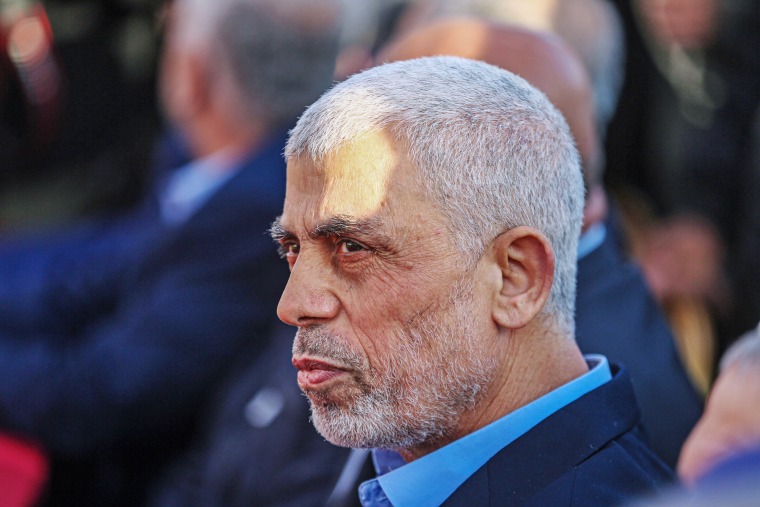Israel would be willing to let Hamas military leader Yahya Sinwar sail into exile in exchange for the release of all hostages and an end to the Hamas government in Gaza, a half-dozen Israeli officials and senior advisers have told NBC News.
The idea of exile to pave the way for a new, deradicalized Gaza governing body has been “on the table” since November, according to another senior adviser to the Israeli government. Officials and advisers discussed the idea with NBC News in early January.
The Israeli government had initially vowed to kill Sinwar and Mohammed Deif, the Hamas leaders who directed the Oct. 7 terror attack that killed 1,200 people in Israel and led to the kidnapping of 240 more. The idea of sending them and four other top leaders into exile instead, much as Yasser Arafat and the Palestine Liberation Organization fled Beirut on a ship 42 years ago, arose after the war’s start as a possible alternative means of removing Hamas leadership from Gaza.
“We don’t mind if [Sinwar] will leave like Arafat left Lebanon,” said a senior adviser to Prime Minister Benjamin Netanyahu. “We will allow it to happen as long as all of the hostages are released.”

Two sources familiar with discussions inside the government said exile was just one of a set of proposals that Israelis floated to the U.S. that included replacing Hamas with hand-picked civilian leaders and reforming Gaza’s education system.
In 1982, as the Israel Defense Forces closed in on Beirut, where the PLO was then headquartered, the U.S. and other international mediators arranged an exit for members of the group and its leader. Hundreds of PLO fighters left Lebanon by ship, followed by Arafat, who lived in exile in Tunisia for a dozen years.
Last week, Qatar’s prime minister and spy chiefs from the U.S., Israel and Egypt met in Paris to discuss a deal they hope will lead to the release of Israeli hostages and the end of the Israel-Hamas war.
After the meeting, the Egyptians conveyed the deal’s framework to the military leaders of Hamas in Gaza, and the Qataris spoke to the political leaders of the group in Doha, Qatar’s capital.

On Tuesday, U.S. Secretary of State Antony Blinken said that Hamas had a “positive reaction” to the proposed terms of the deal. Hamas made a counteroffer with specific terms, as NBC News reported Wednesday, but that response does not mention anything about exile for Sinwar or an end to the Hamas government.
A source with knowledge of the Paris meeting and its aftermath said the Israelis had suggested to the Americans that six Hamas leaders, including Sinwar and Deif, be shipped out of Gaza, but the proposal was never formally presented to Hamas, because Hamas had already ruled out the idea of exile.
The Hamas counteroffer included a complete withdrawal of Israel troops from Gaza, which Netanyahu rejected on Wednesday.
The negotiations for a hostage deal and for what follows the war are ongoing.
‘Magical solution’
Advisers to the Israeli War Cabinet working on scenarios for a post-Hamas Gaza acknowledge it’s unlikely that Sinwar would ever agree to setting sail.

As a former senior Israeli security official told NBC News, “[Exile] is this magical solution that everybody would want, but there’s absolutely no way Hamas would agree to that.”
In addition, Palestinian leaders and Arab governments are wary of any proposals from Israel about how Gaza should be governed in the future, according to foreign diplomats and former U.S. officials.
Israeli officials say they believe Sinwar and Deif are now hiding in tunnels deep below Khan Yunis and Rafah, in southern Gaza.
The officials say IDF troops are getting closer to Sinwar and Deif as they push south in their efforts to destroy Hamas’s military capabilities and free the remaining hostages.
On Monday, Israeli Defense Minister Yoav Gallant said that the IDF had found “materials” of Sinwar’s left behind in his hideouts.
“Sinwar goes from hideout to hideout,” Gallant said at a news conference. “In recent days, IDF troops have found significant materials in the places where he has been recently, and thanks to them, we are deepening our grip on Hamas’ plans.”
Jacob Nagel, a former national security adviser to Netanyahu, said he believes Sinwar still thinks he will emerge from the tunnels victorious. “Sinwar doesn’t care what happens to the people of Gaza,” said Nagel, who is now a senior fellow at the Foundation for Defense of Democracies.
Israel has been exploring options for who might be suitable to lead Gaza and the West Bank in the future, according to two senior advisers to Netanyahu, as well as former Israeli officials who have been involved in negotiations with Palestinians in the past.
The current thinking is that business leaders educated abroad might be the right fit to take the reins of civil affairs in Gaza.
“We need a young leadership, a new leadership that thinks differently, that is willing to talk peace and to change the state of mind and educate the people, both in the West Bank and in Gaza,” a senior adviser to Netanyahu said.
Nagel said: “Deradicalization can be done. It will take time, but it can be done.”
So far, Hamas officials have signaled that no hostages will be released until the war ends. Netanyahu has said the war won’t end until Hamas is dismantled.
“There is no solution besides total victory,” Netanyahu said Wednesday.
To date, more than 26,000 Gazans and more than 500 Israeli soldiers have died in the four-month-old war, according to Gazan health authorities and the Israeli government.






